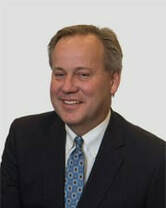
Five Questions With is a regular feature of the Institute for Leadership & Advocacy newsletter that profiles a notable past graduate of the program. The purpose is to share a personal account of an Institute alum who is working to improve their community in a public service role. In this issue we feature 2002 Institute graduate Bob Mack. Mr. Mack serves as a Trustee on the Perrysburg Township Board of Trustees and is a Principal at real estate firm Signature Associates.
- How did you become interested in public service?
I was inspired into public service while at Huron High School and Hillsdale College. My mother, Carol Mack, served as a District Liaison for the late Congressman Delbert Latta, who also found a way for me to attend the 1984 Republican National Convention in Dallas as a youth delegate. This was a very exciting convention, as President Reagan was at the height of his popularity. Following the convention, I was off to Hillsdale College, which has always had a reputation for political science degree leaders.
After moving to Toledo and becoming involved in commercial real estate sales, I observed what I considered to be poor decision-making and conflicts of interest within the preceding Board of Trustees, along with their decision to give an unsecured loan of $5,000,000 to the Rossford Amphitheater Authority at the expense of Perrysburg Township taxpayers. I decided it was time to get involved, especially with encouragement from Wood County leaders. I thought a four-year term would allow me enough time to make some positive changes as one of three Trustees. I never dreamed that five terms later, I would still be interested in finding ways to make Perrysburg Township a better place to live and work. - How did the Institute program prepare you for your roles?
I was very fortunate to learn of the program within the first few weeks of taking office. Perrysburg Township was the poster child for changes that were necessary. Fortunately, I was able to convince the other two trustees, one of which was also new, to enroll in the program and we embraced what we learned each week, especially in the following areas:
A. Running an orderly meeting with an agenda consistent with Roberts’ Rules of Order,
B. Improving relations with local media,
C. Increasing transparency of township business and actions, and
D. Understanding the principle that true success is surrounding yourself with excellence and appointing the right departmental leaders. - What other experience prepared you for your roles?
I have been involved in commercial real estate sales and leasing throughout Northwest Ohio for nearly 31 years. It has been my first and only job since college. As you might expect, the relationship between a buyer and a seller is somewhat by definition adversarial. Oftentimes in government, you face the same type of predicaments. Zoning is an excellent example, whereupon it is necessary to bring people together and perhaps establish common ground which very often involves compromise. It’s also a case where it is difficult to please everyone. One must oftentimes recall the golden rule. - In what specific ways have your roles allowed you to have a positive impact?
Residents and businesses want their government to govern in a predictable fashion and to be fair and equitable. I feel that we have made monumental changes along these lines. When someone stands before the Perrysburg Township Board of Trustees, they can be assured that they will be treated with respect, their opinion matters, and if follow-up is necessary, they can expect timely action. - What have been the most challenging situations you have experienced in your roles?
Having been in the private sector the first half of my career, it can be challenging to work within the confines of the Ohio Revised Code and the various layers of bureaucracy that inflate the costs of providing services. The ORC doesn’t necessarily allow government to be “nimble and entrepreneurial”. The ORC is a very necessary document that Ohioans should be proud of and we should always be looking for ways to refine it to allow government to control its expenditures and save precious tax dollars.

 RSS Feed
RSS Feed
